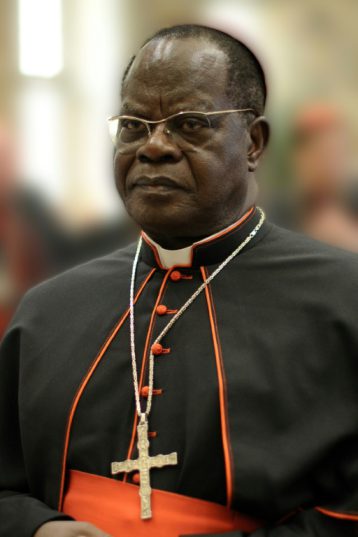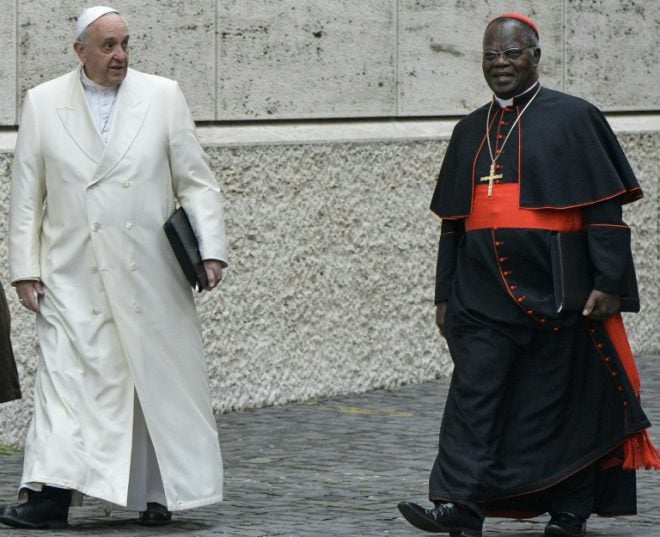Reeza slams Proteas to T20I series win over Pakistan
The man in the spotlight is Cardinal Laurent Monsengwo, archbishop of Kinshasa and de-facto leader of the Democratic Republic of Congo’s powerful Catholic church.
For decades, the cardinal has spoken out against the violence that has swept through parts of the sprawling country, including successive civil wars that killed millions.
His outspokenness has now turned him into a rallying figure for protest against President Joseph Kabila, whose regime is tarred with a reputation for corruption, repression and incompetence.
Last week, Monsengwo placed himself on a potential collision course with Kabila over a New Year’s Eve crackdown on Catholic demonstrators demanding an end to Kabila’s 17 years in power — more than a year beyond his constitutional term.
– ‘Barbarism’ –
“We can only denounce, condemn and stigmatise the behaviour of our supposedly courageous men in uniform, who, sadly… are channelling barbarism,” Monsengwo said in an outraged statement.
The cardinal went on to dedicate his mass on Thursday to the victims of “police brutality,” whom he likened to the martyrs of the country’s independence. He is to lead a mass on Friday to commemorate their deaths.
“It’s time that truth won out over systematic lies, that mediocre figures stand down and that peace and justice reign in DR Congo,” he declared.
Witnesses said troops and police unleashed tear gas in churches and fired bullets into the air to break up gatherings. An AFP reporter at a demonstration in the central city of Kananga saw a man shot in the chest by soldiers who opened fire on worshippers.

Cardinal Monsengwo is famous for his combative stance in a country mired in poverty, corruption and lawlessness
The protest organisers said 12 were killed, while the UN gave a toll of at least five dead, 92 injured and 180 people arrested — a figure that it said could be “far higher,” as its investigators had been barred from visiting morgues, hospitals and detention centres.
Monsengwo’s remarks stirred a near-immediate rebuke from the government, which demanded the church be neutral in politics.
“Monsignor Laurent Monsengwo has made insulting remarks about the leaders of the country and the forces of order,” the council of ministers said — a choice of words that, for some, were a reminder that under DRC’s penal code, people who insult the military can be prosecuted.
The government “cannot accept that such statements come from a minister of God”, the government added, which hammered home “the secular nature of the Congolese state.”
Monsengwo’s fury comes on the heels of a failure last year to implement a church-brokered deal aimed at averting a bloodbath.
Under the December 31 2016 agreement, Kabila was allowed to stay in office provided new elections were held in 2017.
After months of silence, the authorities said the vote would be held in December 2018 — a postponement that has angered Western nations, but one that they have reluctantly had to accept.
– Ally in Pope –

Monsengwo is reputed to have a close ally in Pope Francis
Born into a royal family in the Sakata tribe in 1939, Monsengwo first became known for playing a major role in forcing dictator Mobutu Sese Seko into moving the country — which was known as Zaire from 1971 to 1997 — towards a multi-party democracy.
Monsengwo was made a cardinal by Pope Benedict XVI in 2010, and later named one of nine cardinals chosen by Pope Francis to play a part in Vatican reform.
Those close ties were reflected on Saturday. The Vatican’s envoy in Kinshasa, Luis Mariano Montemayor, an Argentine close to the Pope, attacked the “disproportionate reaction” of the security forces in crushing the New Year’s Eve march.
DRC is rich in minerals, especially cobalt — a critical metal for lithium-ion batteries used in mobile phones and electric cars — but is hampered by great inequality and a history of violence.
Roughly half of its 80 million people are Catholics. The church helps to provide education and healthcare to millions of people in the absence of state services and is one of the few institutions to enjoy broad credibility across the country.
Download our app and read this and other great stories on the move. Available for Android and iOS.